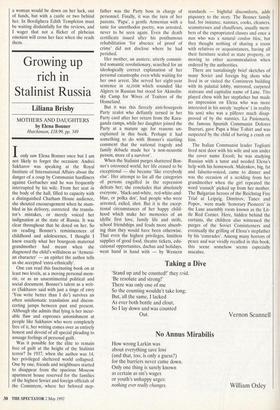Growing up rich in Stalinist Russia
Liliana Brisby
MOTHERS AND DAUGHTERS by Elena Bonner Hutchinson, £18.99, pp. 349 Ionly saw Elena Bonner once but I am not likely to forget the occasion: Andrei Sakharov was speaking at the Royal Institute of International Affairs about the danger of a coup by Communist hardliners against Gorbachev and he was frequently interrupted by his wife. From her seat in the body of the hall, filled to capacity with a distinguished Chatham House audience, she shouted encouragement when he stum- bled in his delivery, corrected the transla- tor's mistakes, or merely voiced her indignation at the state of Russia. It was clear throughout that he doted on her. So on reading Bonner's reminiscences of childhood and adolescence, I thought I knew exactly what her bourgeois maternal grandmother had meant when she diagnosed the child's wilfulness as 'Armeni- an character' — an epithet the author tells us she accepted 'extra-ethnically'.
One can read this fascinating book on at least two levels, as a moving personal mem- oir, or as an unsentimental political and social document. Bonner's talent as a writ- er (Sakharov said with just a tinge of envy 'You write better than I do') survives an often unidiomatic translation and discon- certing jumps between past and present. Although she admits that lying is her incur- able flaw and expresses astonishment at people like Sakharov who were completely free of it, her writing comes over as entirely honest and devoid of all special pleading to assuage feelings of personal guilt.
Was it possible for the elite to remain free of guilt at the height of the Stalinist terror? In 1937, when the author was 14, her privileged sheltered world collapsed. One by one, friends and neighbours started to disappear from the spacious Moscow apartment house reserved for the families of the highest Soviet and foreign officials of the Comintern, where her beloved step-
father was the Party boss in charge of personnel. Finally, it was the turn of her parents. 'Papa', a gentle Armenian with a taste for unorthodox poetry, was arrested, never to be seen again. Even the death certificate issued after his posthumous rehabilitation 'for absence of proof of crime' did not disclose where he had perished.
Her mother, an austere, utterly commit- ted romantic revolutionary, searched for an ideologically correct explanation of her personal catastrophe even while waiting for her own arrest. She served her eight-year sentence in ALZHIR which sounded like Algiers in Russian but stood for Akmolin- sky Camp for Wives of Traitors of the Homeland.
But it was this fiercely anti-bourgeois Party zealot who defiantly turned in her Party card after her return from the Kara- ganda camps, while her daughter joined the Party at a mature age for reasons un- explained in this book. Perhaps it had something to do with Bonner's startling comment that the national tragedy and family debacle made her 'a non-neurotic person, more of a survivor'.
When the Stalinist purges shattered Bon- ner's cocooned world, her life ceased to be exceptional — she became 'like everybody else'. Her attempt to list all the categories of persons engulfed in the repression defeats her; she concludes that absolutely everyone, 'black-and-white, red-white-and- blue, or polka dot', had people who were arrested, exiled, shot. But it is the excep- tional circumstances of her happy child- hood which make her memories of an idyllic first love, family life and strife, school friendships and feuds more absorb- ing than they would have been otherwise. That even the highest privileges, limitless supplies of good food, theatre tickets, edu- cational opportunites, dachas and holidays, went hand in hand with — by Western standards — frightful discomforts, adds piquancy to the story. The Bonner family had, for instance, nannies, cooks, cleaners, seamstresses and chauffeurs, usually mem- bers of the expropriated classes and once a nun who was a natural cordon bleu, but they thought nothing of sharing a room with relatives or acquaintances, having all their furniture sealed as state property, or moving to other accommodation when ordered by the authorities.
There are tantalisingly brief sketches of many Soviet and foreign big shots who lived in or visited the Comintern building with its palatial lobby, mirrored, carpeted staircase and capitalist name of Luxe. Tito played chess with her stepfather but made no impression on Elena who was more interested in his unruly 'nephew' ( in reality his son) who was a pilferer much disap- proved of by the nannies. La Pasionaria, the famous Spanish Communist Dolores Ibarruri, gave Papa a blue T-shirt and was suspected by the child of having a crush on him.
The Italian Communist leader Togliatti lived next door with his wife and son under the cover name Ercoli; he was studying Russian with a tutor and needed Elena's help with his homework. Malenkov, big, fat and falsetto-voiced, came to dinner and was the occasion of a scolding from her grandmother when the girl repeated the word 'eunuch' picked up from her mother. The Bulgarian heroes of the Reichstag Fire Trial at Leipzig, Dimitrov, Taney and Popov, were made 'honorary Pioneers' in the Luxe assembly room known as the Lit- tle Red Corner. Here, hidden behind the curtains, the children also witnessed the purges of the Soviet Cominterners and eventually the grilling of Elena's stepfather by his 'comrades'. Among many horrors of peace and war vividly recalled in this book, this scene somehow seems especially macabre.


















































 Previous page
Previous page